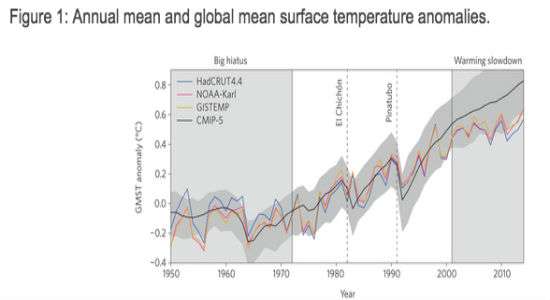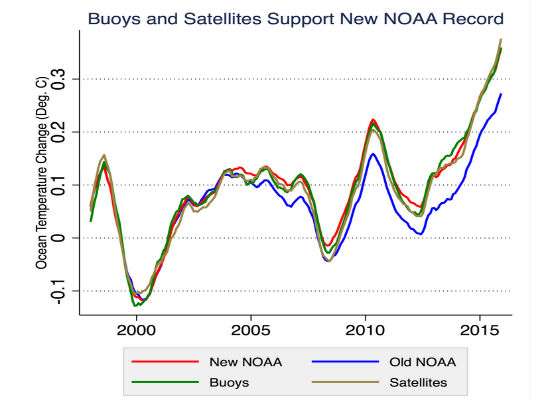Climate Scientists Manipulated Temperature Data to Fool Politicians and Public, Claims 'Whistleblower'
Another update on the 'settled science' of climate change

The Daily Mail reports that climate scientists at the National Oceanic and Atmospheric Administration manipulated temperature data to make it look like the rate of global warming is speeding up after 2000. Their study published in 2015 in Science called into question the existence of the 17-year long "hiatus" during which the increase in global average temperature had significantly slowed. In its 2013 comprehensive Fifth Assessment Report, even the Intergovernmental Panel on Climate Change noted, "The rate of warming of the observed global mean surface temperature over the period from 1998 to 2012 is estimated to be around one-third to one-half of the trend over the period from 1951 to 2012." The NOAA study instead found that the oceans are warming at 0.12 degrees Celsius (0.22 degrees Fahrenheit) per decade since 2000, which is nearly twice as fast as earlier estimates of 0.07 degrees Celsius per decade. This rate is similar to the warming that occurred between 1970 and 1999.
The goal of 2015 Science study, according to the Mail, was to convince policy makers and the public of the need to adopt what would become the Paris Agreement on climate change that aims to keep global temperature from rising beyond 2 degrees Celsius above the pre-industrial average. This goal would be achieved chiefly by curbing the emissions of carbon dioxide produced by burning oil, gas, and coal.
The Mail's reporting relies chiefly on claims being made by now-retired NOAA climate scientist John Bates whose expertise is verifying and archiving data. In an interview with the Mail, Bates is quoted as accusing….
…the lead author of the paper, Thomas Karl, who was until last year director of the NOAA section that produces climate data – the National Centers for Environmental Information (NCEI) – of 'insisting on decisions and scientific choices that maximised warming and minimised documentation… in an effort to discredit the notion of a global warming pause, rushed so that he could time publication to influence national and international deliberations on climate policy'.
According to Bates, both the sea surface and land temperature data were adjusted at the insistence of now retired NOAA researcher Tom Karl in ways that created specious warming trends and that both are now being reviewed to see if corrections are warranted. Bates also asserts that the data on which the 2015 study was based were not properly archived such that other researchers would be able to check what was done to the data.
So settled science? Not hardly. In February 2016, Nature Climate Change published an article by a prominent group of researchers led by Canadian climate scientist John Fyfe that concluded that global warming hiatus is real and thus strongly contradicted Karl's 2015 Science study:
It has been claimed that the early-2000s global warming slowdown or hiatus, characterized by a reduced rate of global surface warming, has been overstated, lacks sound scientific basis, or is unsupported by observations. The evidence presented here contradicts these claims.

The above figure by Fyfe and his colleagues compares three different surface temperature records with 124 simulations from 41 different climate models. As you can see the models are running hotter than the actual temperature trends and the pace of warming did slow down after 2000. As Nature News reported: "There is this mismatch between what the climate models are producing and what the observations are showing," says lead author John Fyfe, a climate modeller at the Canadian Centre for Climate Modelling and Analysis in Victoria, British Columbia. "We can't ignore it."
Next in this saga of data slinging is a new study published in Science Advances just last month by the researchers from the Berkeley Earth group that concludes that the adjustments made under the direction of Karl at NOAA are basically correct. Today over at Carbon Brief, lead Berkeley Earth researcher Zeke Hausfather notes that the Daily Mail article failed to mention his study which found that the revised NOAA temperature data are accurate.

Hausfather writes:
In a paper published last month in the journal Science Advances, we compared the old NOAA record and the new NOAA record to independent instrumentally homogenous records created from buoys, satellite radiometers, and Argo floats. Our results, as you can see in the chart below above, show that the new NOAA record agrees quite well with all of these, while the old NOAA record shows much less warming.
This was due to two factors: the old NOAA record spliced together warmer ship data with colder buoy data without accounting for the offset between the two; and the new NOAA record puts more weight on higher-quality buoy records and less weight on ship records (versus the old NOAA record which treated ships and buoys equally).
In the Mail, Bates says:
Whatever takes its place, said Dr Bates, 'there needs to be a fundamental change to the way NOAA deals with data so that people can check and validate scientific results. I'm hoping that this will be a wake-up call to the climate science community – a signal that we have to put in place processes to make sure this kind of crap doesn't happen again.
'I want to address the systemic problems. I don't care whether modifications to the datasets make temperatures go up or down. But I want the observations to speak for themselves, and for that, there needs to be a new emphasis that ethical standards must be maintained.'
He said he decided to speak out after seeing reports in papers including the Washington Post and Forbes magazine claiming that scientists feared the Trump administration would fail to maintain and preserve NOAA's climate records.
Dr Bates said: 'How ironic it is that there is now this idea that Trump is going to trash climate data, when key decisions were earlier taken by someone whose responsibility it was to maintain its integrity – and failed.'
Bates' charges about data manipulation are serious and must be properly investigated (although how to do that dispassionately and objectively in the politicized field of climate science is not at all clear).


Show Comments (242)